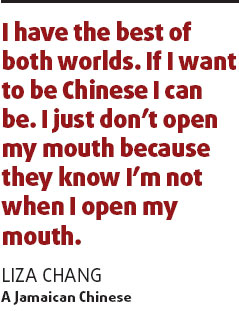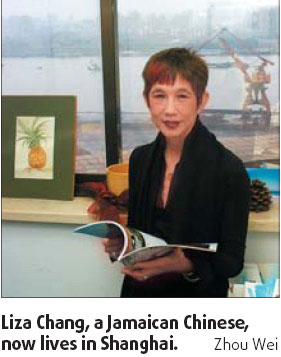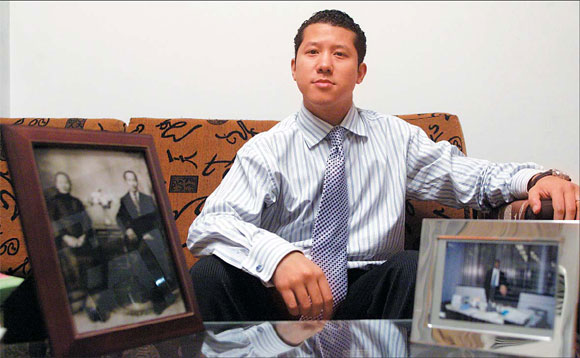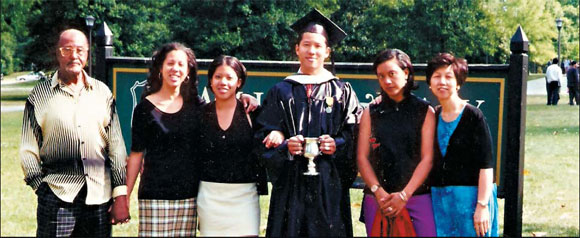They've come a long way
|
Earl Carr, an assistant vice-president at HSBC Bank. Gao Erqiang |
Liza Chang lives in Shanghai but her heart remains in the distant Caribbean island where she was born. Here, her Chinese appearance lets her blend in anywhere. Push a little further and her background is more complex: Her father is Hakka Chinese and her mother is half Chinese and half Scottish-Jewish. She holds a US passport.
In China, her home now for several years, she could identify herself in a number of ways. But she's settled on one.
"I am a Jamaican Chinese," she says without hesitation.

Chang, who manages several five-star hotel spas in China, says most people assume she's Chinese, until she starts to speak English with a Jamaican accent.
"I have the best of both worlds. If I want to be Chinese I can be. I just don't open my mouth because they know I'm not when I open my mouth," Chang, 53, says.
Chang was born in Jamaica to parents from the former British colony. She was raised in a large family that included her late grandfather, who left his native Guangdong province for Jamaica in 1908.
"The reason why my grandfather went to Jamaica is the same reason all the other Jamaican Chinese went - because they came from the same village," she says.
Like many other Chinese who went to Jamaica, Trinidad, Panama or the South American country of Guyana, they fled poverty and sought opportunities.
The wave of immigrants from southern China to the English-speaking Caribbean in the early-to-mid 1900s came after another type of immigration nearly a century earlier.
During the 1850s, thousands of Chinese were transported on ships to work in Panama, Jamaica and other countries in the region. They were recruited or indentured laborers taken there to work after slavery was abolished.
Once there, they worked hard to preserve their Chinese heritage. Many opened Chinese restaurants and thrived in other businesses. They established close-knit Chinese communities but also embraced local culture and inter-married with blacks. Amid political and economic difficulties in those countries in the 1970s, many embarked on a second migration that took them to Canada or the United States.
Chang often thinks about home. "I really do miss family. I come from a big family. We're all scattered now but Jamaica is still home," she says.
Before China, Chang says she hardly thought about her heritage but she "discovered" she was Chinese when she read the novel The Joy Luck Club by Amy Tan. The book, about four Chinese women who left China for the United States in the 1940s, was made into a movie in 1993.
Today, many Chinese remain in Jamaica and the rest of the Caribbean, including prominent musicians and successful business owners. They've prospered in multi-cultural societies like Jamaica where many Europeans, Syrians, Indians and Jews have lived for many years.
Chang, for example, studied in Canada and lived in the United States for 15 years before her father's death prompted her to move back to Jamaica. There she met her future husband, a Frenchman, and they later moved to Singapore and lived in other countries until moving to China.
"When I came to China, I kept on saying I was Hakka Chinese," she says, referring to a subgroup of Han Chinese living mainly in southern China, particularly Guangdong and Fujian provinces.
In Shanghai, she is a member of another group, along with Earl Carr, who traces his roots to Panama. In April, they helped form the Caribbean Association in China, which sponsors social events and raises money for migrant schools and other charities.

Carr, 29, an assistant vice-president at HSBC Bank, also has a complex interracial background that has led to both positive and negative encounters in the United States and to some extent, in China.
Born to a black Jamaican father and a Chinese mother who also traces her roots to Guangdong province, Carr's mixed background was not well received by his mother's parents who refused to meet his father because he was black.
Carr met his Chinese grandfather only once, during a family gathering that lasted five hours. He asked the elderly man about his life and learned a little about why he fled China and went across the world to Panama.
"What he told me was that conditions in China were just horrible at that time," Carr recalls. "They couldn't find work at that time, and with the Japanese occupation, resources were scarce."
His grandparents moved to Panama during the 1940s where all of their children were born, Carr says. His mother went to an American university on a scholarship where she met her future husband. His father, a former diplomat who was the Jamaican ambassador to China, traveled extensively and took Carr on some trips.
Although he's half Chinese and half black, Carr refers to himself as black. He says that in China, he's learned to understand that his background is too complex for many to understand or accept.
"I think it's impressed upon me so much more the importance of being black in China because there's such a stigma of being black here," he says.
He's married to a Taiwanese woman he met in college and he's a Christian.
Like Chang, strangers often ask about his background, and his response is simple, or if he feels like it, he offers more details.
"I always say (I'm) black because in China, if you tell people my dad is Jamaican, they don't make the connection with black Jamaican."
"The second thing is I always tell them that my mother is Panamanian Chinese, as in 'yes she's Chinese' but my mother cannot speak Chinese, my mother knows nothing about Chinese culture. And I always tell them I was born in Panama and I grew up in New York City."
He was born in Panama and took Jamaican citizenship because his father was a diplomat and his children were required to carry Jamaican passports. He later lived in the United States and is now an American citizen.
Carr says his first trip to China was out of "curiosity" when he was a foreign student at Beijing Normal University. He came back last year to work as a marketing specialist for an international consulting firm until he joined the bank.
He regularly volunteers to teach English to migrant students and was a volunteer at the recent Special Olympics in Shanghai.
"China is incredible, when I first came to China as opposed to now, China was more of a curiosity," he says.
Several years ago, with a strong urge to find out more about his grandfather's past, he went to Guangdong with an old photograph and visited a retirement home. He asked everyone whether they knew his grandfather but no one seemed to know except for one person.
He found the home after a 20-minute drive and a neighbor unlocked the doors. Inside, there were bags filled with personal belongings, he says. He wasn't allowed to remove any items but he was glad to see one thing.
"No one had lived there for 60 years. On the third floor we walked around and I found an altar with his picture," he says. The photo in the house was an exact copy of the one his grandfather gave him, leaving no doubt it was his former home.
"I had to thank God for this amazing opportunity," he says.
|
Earl Carr with (R to L) mother Emily Carr, sisters Carolyn, Lisa and Linda Carr, and grand uncle Roland McNally. Courtesy of Earl Carr |
(China Daily 01/16/2008 page18)
















